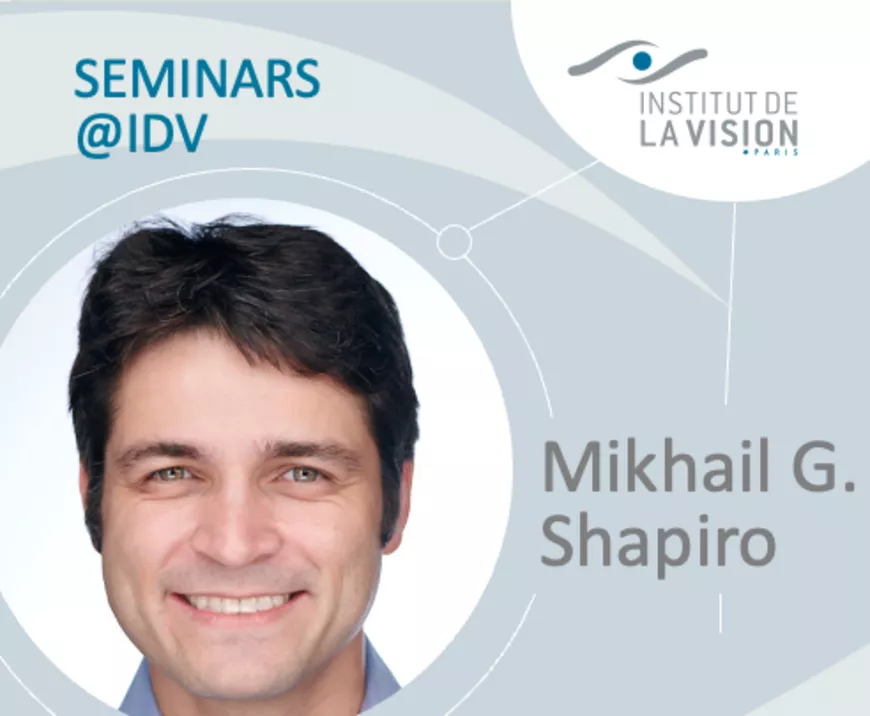Talking to cells: biomolecular ultrasound to image and control cells deep inside the body
Invited by Serge Picaud, Pr Mikhail G. Shapiro (Max Delbrück Professor of Chemical Engineering and Medical Engineering, Caltech, USA / Investigator, Howard Hughes Medical Institute) will speak on Tuesday January 28th - 11.30 AM. Meet in Salle Lusseyran.

Abstract
Studying biological function in intact organisms and developing targeted cellular therapies requires methods to image and control the function of specific cells deep inside the body. Fluorescent proteins and optogenetics serve this purpose in small, translucent specimens, but are limited by the poor penetration of light into deeper tissues. In contrast, most non-invasive techniques such as ultrasound and magnetic resonance imaging – while based on energy forms that penetrate tissue – are not effectively coupled to cellular function. Our work attempts to bridge this gap by engineering biomolecules with the appropriate physical properties to interact with sound waves and magnetic fields. In this talk, I will describe our recent work on biomolecular reporters and actuators for ultrasound. The reporters are based on gas vesicles – a unique class of air-filled protein nanostructures derived from buoyant photosynthetic microbes. These proteins scatter sound waves, enabling their detection with ultrasound. I will describe our progress in understanding the biophysical and acoustic properties of these biomolecules, introducing them genetically into various cell types of interest for in vivo imaging, and turning them into dynamic sensors of intracellular molecular signals. In addition to their applications in imaging, gas vesicles can be used to control cellular location and function by serving as receivers of acoustic radiation force or seeding localized bubble cavitation. Additional control is provided by thermal bioswitches – biomolecules that provide switch-like control of gene expression in response to small changes in temperature. I will describe how these functionalities allow the development of remote-controlled cell therapies and diagnostics.
About Mikhail G. Shapiro
Max Delbrück Professor of Chemical Engineering and Medical Engineering, Caltech
Investigator, Howard Hughes Medical Institute
Fulbright-Tocqueville Distinguished Chair, ESPCI 2024-5
Mikhail Shapiro is the Max Delbrück Professor of Chemical Engineering and Medical Engineering, an HHMI Investigator, and Director of the Center for Molecular and Cellular Medicine at Caltech. The Shapiro laboratory develops biomolecular technologies allowing cells to be imaged and controlled inside the body using noninvasive methods such as ultrasound. Mikhail received his PhD in Biological Engineering from MIT and his BSc in Neuroscience from Brown. He conducted post-doctoral research at the University of Chicago and UC Berkeley. During the 2024-5 academic year, Mikhail is conducting research at the Physics for Medicine Institute in Paris and ESPCI as a Fulbright-Tocqueville Distinguished Chair.
Mikhail’s awards include the NIH Pioneer Award, the Vilcek Prize for Creative Promise, the Camille Dreyfus Teacher-Scholar Award and the Carl Hellmuth Hertz Ultrasonics Award. Mikhail is an inducted Fellow of the World Molecular Imaging Society. Alongside academic research, Mikhail has been involved as a founder and adviser to several biotechnology and medical device startups. More information about the Shapiro Lab can be found online at shapirolab.caltech.edu.
